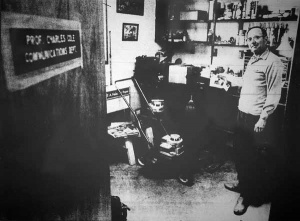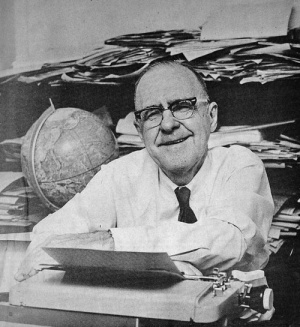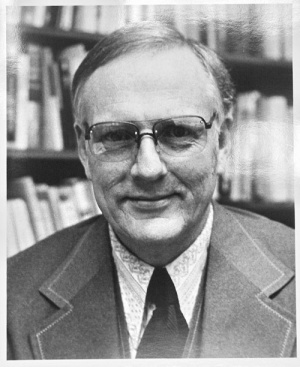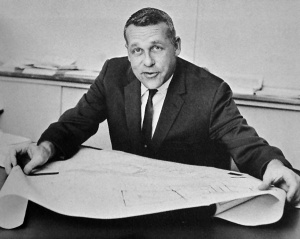Personal tools
Help
Tools
Class Notes
- Do you have news for fellow WSU alumni and other readers of Washington State Magazine? Send us your class note.
Our Story
written by alumni, faculty and friends.
NOTE: THIS IS A LEGACY SITE AND IS NOT REGULARLY MAINTAINED
Views
My best and toughest journalism professors at WSU
From Our Story
by Pat Caraher '62
Without a doubt the best years of my life so far were spent at Washington State University – 11 semesters as a student and 35 bonus years as an employee.
My best professors were the most demanding. The journalism program in the 60s seemed to have a corner on them – Charles O. Cole, Maynard Hicks and Tom Heuterman. Each taught for three decades or more at WSU. Two others in communications also left their mark on me – Bob Mott and Bill Hall.
It's been a long time since I learned the five W's of reporting. Who? What. When? Where? Why? In journalism classes we were taught to prepare, work hard, stay on task, be curious, ask tough questions, don't assume anything, tell both sides, be fair, be accurate, don't plagiarize, meet deadlines.
I enrolled in Introductory Journalism as a sophomore in 1958. Six weeks into the semester I was hospitalized with a broken leg. When I returned to class Professor Cole informed me a paper was due. "Have it in my office by 5 o'clock today," he said.
I finished the assignment, but not the semester. My leg required additional surgery in Seattle. I dropped out of school but re-enrolled in January. For whatever reason, I never took another journalism course en route to a degree in social sciences. Ironically, to me at least, Edward R. Murrow was our 1962 commencement speaker.
A two-year Army hitch in Alaska followed. I wouldn't trade the experience. It wasn't the career I was seeking long term, however. Neither was construction work, or switching boxcars at night for the Great Northern Railroad in winter. I wanted to become a journalist.
Chuck Cole
Professor Cole was waiting in 1965 when I returned to WSU to pursue a second degree. I took most of the courses in the journalism sequence, joined the Evergreen staff, interned with Sports Information Director Dick Fry and contributed occasional sports stories to the Seattle P-I.Cole cut students little slack in his reporting classes. A single misspelled word reduced our grade to a C, two misspellings to an automatic F. I remember one of my peers intended to write about students who "live" on campus. Instead the verb read "love."
"There's a big difference," Cole said in dead seriousness.
We all dreaded Cole's "sob sheet." He'd bring the front page of the Evergreen to class with our mistakes in spelling, grammar and sentence structure circled in red ink. He also circled misleading headlines and inaccurate photo captions. He didn't miss much. It proved to be an irritating but effective teaching tool. I once ran an editorial by a syndicated columnist as a news story. I never made the same mistake again.
If Cole knew so much about writing, I wondered, why didn't he get a real newspaper job? He did. Twenty-one summers as a copy editor or feature writer on three Northwest dailies. Hello.
The crusty, chain-smoking Texan had a warm side too. He complimented the good work that we did.
"Writing is more personal than anything else we do than love-making," he once said. "View the world with a degree of healthy skepticism. When you become professional journalists, you will be lied to, led down the primrose path and obfuscated all over the landscape."
Part of Cole's legacy was helping create a summer internship program for communication students. Some of those connections led to job offers.
After 30 years (1956-1986) at WSU Cole retired to Sequim. He died Nov. 15, 2001.
Maynard Hicks
Maynard Hicks arrived in Pullman via Michigan in 1937. He never left. During 37 on the WSU journalism faculty he taught reporting, editing, proof-reading, feature writing, advertising, radio continuity and public relations. In the latter class, one of our assignments was to identify and analyze a successful PR program. My choice was Bill Veeck, maverick owner of several major league baseball teams.I read his autobiography "Veeck as in Wreck." The consummate showman and innovator introduced Ladies Day and Disco Demolition Night, uniforms with short pants and hired a midget for one appearance as a pinch hitter with the St. Louis Browns.
When it came time to share my findings on Veeck, my presentation was cut short by a classmate's report that ran 15 minutes too long. I received a C in the course, much to my chagrin. I fired off a letter to Professor Hicks questioning my grade. His written response was quick and pointed. "Life is full of disappointments," he began. We both moved on in mutual respect.
Hicks's enthusiasm for journalism and interest in students was unequaled in my opinion. He served as advisor to both the Evergreen and Chinook yearbook staffs. Later, when I was editing Hilltopics for my alma mater, he became a valued news source. He often hand delivered his story tips typed or scrawled on 3 by 5 inch cards. I once invited him to write a feature on Pullman's infamous 1949 Easter massacre. He accepted without hesitation or gratuity.
It should be noted that during World War II Hicks carried one of the heaviest work loads on campus. In addition to other academic responsibilities, he managed the News Bureau and Sports Information operations, and edited an alumni publication.
Maynard died May 12, 2000 in Pullman at 93. His widow, Demy, marked her 100th birthday in October.
Tom Heuterman
Tom Heuterman joined the faculty in 1965. The former Evergreen editor and alumnus taught mass communications and society, news writing, public affairs reporting, beginning reporting and a journalism seminar. His 31-year tenure included stints as Chairman of Communication and Head of the Journalism Program.Heuterman brought a "boots on the ground" element to the classroom. His background included eight years as a public affairs reporter at the Yakima Herald-Republic. At the time, a "cub reporter" at the paper was sent out to the Yakima Proving Grounds, where the war movie "To Hell and Back" was being shot. The movie starring Audie Murphy was a follow up to his autobiography of the same title.
The young reporter concluded his lengthy interview by asking Murphy "Did you ever serve in the Army?" Murphy of course was the most decorated American combat soldier of World War II.
Heuterman shared the story with his students. Do your research. Get the story and get it right, he said. Assignment editors don't want excuses.
In his reporting classes we were required to write 30 column inches of copy per week and submit a carbon copy to the Evergreen for possible publication. Among my assigned beats were the WSU police and fire departments, and the WSU Alumni Association. On my weekly interviews with Alumni Director E.G. "Pat" Patterson, we developed a trusting relationship. In 1969 he recruited me away from the Eugene (Ore.) Register-Guard to create the new alumni publication Hilltopics.
If Heuterman ever awarded an A, I can't remember receiving one. I always exceeded his quota for lineage. The lesson learned–quality beats quantity.
Under Heuterman's direction in 1998 the Communication Department initiated a required 45-minute pretest of all prospective WSU communications students. He believed that the essay tests logic and clarity of thought, which are not as easy to correct as errors in spelling or grammar.
Heuterman is retired in the Mount Vernon area.
Bob Mott
We called Bob Mott "The Colonel," but not to his face. He had a military bearing about himself, ramrod straight with a deep voice. He served as a company commander of an Airborne Infantry outfit in Europe during World War II. His decorations include the Ardennes Campaign Battle Star and Purple Heart. When he spoke, we listened.Mott joined the faculty in 1956 and later served as chair and professor of the Department of Communication and manager of Radio-TV Services.
I'll never forget the first day of class in Broadcast News Editing. He distributed a sheet with approximately 20 instructions. "Follow directions." he said. "Read all the questions first. This is a timed quiz."
We immediately began writing our responses. The last instruction -- "Write only your name on the top of the page and turn it in." It was futile to try to erase what we'd already done. We didn't follow Mott's order "Follow directions."
Mott closely monitored the 5 p.m. nightly newscasts prepared by his students and aired on KWSC Radio. We ripped wire service stories off the Associated Press machine in Murrow Hall, edited and rewrote stories, and wrote transitions between. He left to our own news judgment the lead story from the local, regional, national and international reports we had assembled. Each newscast was to include a short live phone interview. We ended the half-hour newscast with a "bright" or upbeat story.
Mott left WSU in 1968 to become executive director with the National Educational Radio Division of Educational Broadcasters in Washington, D.C. He's now retired in San Diego.
Bill Hall
One of the best–and toughest--writing courses I took was taught by Bill Hall. The longtime editorial page editor of the Lewiston Morning Tribune is now retired, but occasionally writes an editorial for the Trib.
Students enrolled in the Critical Writing course met twice a week, first in the classroom and the following period in the typing lab. There is where we sweat blood. I was employed by the university at the time and enrolled in the class to gain added experience.
For starters Hall asked us to write an autobiography. Many were written chronologically. "I was born...."
"The fact that you were born might not be the most important thing to the reader," he said. "Unless you happened to be born a Siamese twin, for example."
He always carried a small note pad in his shirt pocket and encouraged us to do the same. All the better to jot down story ideas as they came to mind. He wanted us to be thinking about story ideas, angles and leads before we sat down to type our stories in class under deadline.
We wrote to a specific length – 72 typewritten lines, the requirement he had for his editorials at the Tribune. We received our assignments a day ahead. Write a humorous column, a column to convince or persuade, or explain the rules of a game. Take a stance on a controversial topic – abortion, capital punishment, the right to bear arms, fluoridation of drinking water. Don't straddle the fence, he said. If we took the pro side of an issue initially, we had to write the other side the next assignment and defend our position just as forcefully.
Hall taught us to think and write under pressure mainly from mental notes. To prepare he encouraged us to read a daily paper, listen to radio and televised news casts, and talk to our peers and other professors.
The day the Space Shuttle Challenger exploded moments after blastoff in 1988 was our writing day.
"You know what to write about today," Hall said. "I shouldn't even have to tell you."
While I had many great teachers at WSU, I'm especially grateful to my mentors in journalism. They provided the building blocks and inspiration I came to rely on as a newsgather, writer, reporter, storyteller, editor and sometimes historian.
I can hear Heuterman now. "Caraher you still write too long."
Our Story site map
Our Story main page | Our Story categories | Help Desk
Contact | Give | Advertise
Washington State Magazine | Washington State University | Class Notes
Our Story is coordinated by
In partnership with
Our Story and Washington State Magazine are publications of Washington State University. All rights reserved.
P.O. Box 641227, Washington State University, Pullman, WA 99164-1227 USA | wsm@wsu.edu, 509-335-2388
Accessibility | Copyright | Policies




